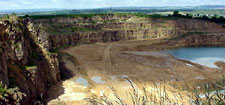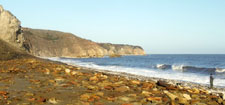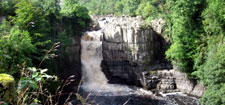Geodiversity
Geodiversity – the variety of rocks and minerals, landforms, soils and geological process – is a key component of our natural heritage. It is fundamental to the character and diversity of our landscapes, influencing both their physical form and their natural vegetation, which in turn have influenced patterns of farming and settlement. The exploitation of minerals has had a profound effect on many of the county’s landscapes and the variety of materials won are an essential part of the local distinctiveness of its buildings and townscapes.
Unlike biodiversity, which is now firmly established as an essential concept in dealing with environmental issues, geodiversity as an idea is only now gaining recognition. Many geological and geomorphological features have been seen in the past as being sufficiently robust not to require protection or management. They are, however, vulnerable in many ways.
- New development can damage natural topography or geological exposures.
- The infilling of quarries can destroy exposures of scientific or educational interest.
- Natural weathering, the encroachment of vegetation, or poaching by livestock, may damage or obscure geological features.
- Engineering works to rivers and streams, or coastal defences, may interfere with natural processes and damage natural features.
Geodiversity as a concept also has a cultural dimension – it encompasses the way minerals have been used, understood, collected recorded and interpreted. Since the 14th century when Richard de Bury, Bishop of Durham, first used the term ‘geologia’ to describe the ‘earthly science’ the county has played an important role in the development of the geological sciences. The North Pennines AONB has recently been designated as a European Geopark, the first on the UK mainland.
Conserving Geodiversity
Conserving geodiversity requires a combination of statutory protection for nationally important sites, the protection of both non-statutory sites and geodiversity interests in general from the impacts of development, and active management of sites and features of importance to geodiversity.
The county’s most important sites have statutory protection as Sites of Special Scientific Interest (SSSI). Some were notified specifically for their geological interest, and many of those notified for other reasons contain features of geological significance. The county also contains a number of non-statutory sites: Regionally Important Geological and Geomorphological Sites (RIGS) and Durham County Geological and Geomorphological Sites (DCGS). Policies for the protection of these sites are contained in local plans. The County Durham Geological Conservation Strategy 1994, the first such strategy produced by a local authority, contains additional policies for identifying, creating and interpreting geological sites.
A Geodiversity Audit has recently been prepared by the British Geological Survey (BGS) in collaboration with Durham County Council, with funding from the Aggregates Levy Sustainability fund (ALSF) administered by the Minerals Industry Research Organisation (MIRO). A countywide Geodiversity Action Plan is currently being planned. A similar Geodiversity Audit and Action Plan has been prepared for the North Pennines Area of Outstanding Natural Beauty (AONB) and European Geopark. The action plan contain a broad range of tasks for conserving geodiversity.
Interpreting Geodiversity
Increasing public awareness, understanding and enjoyment of geodiversity is central to its conservation. It also presents opportunities to increase understanding of the landscape as a whole and the physical factors that underpin local distinctiveness and biodiversity.
The North Pennines GAP and any future County Durham GAP will provide a framework and detailed action points for interpreting earth science. In the North Pennines AONB a considerable amount of work has already been done to promote the geodiversity of the Geopark and secure funding to support the implementation of the GAP.
Objectives
- To support and facilitate the conservation of geodiversity in County Durham.
- To promote awareness, understanding and enjoyment of geodiversity.
- To support the production of a Geodiversity Action Plan for County Durham.
- To encourage and support the implementation of the North Pennines AONB Geodiversity Action Plans.
- To support the work of the North Pennines AONB Partnership in promoting and interpreting the geodiversity of the Geopark.
Further Information
For further information on the North Pennines AONB Geopark visit the North Pennines Area of Outstanding Natural Beauty website website.



